

politics * science
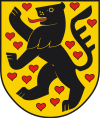
Weimar Republic
COHORT
Goethe's spiritual-cosmological viewpoint was strongly influenced by
-
Ethica ordine geometrico 1632-1677 Baruch Spinoza
Goethe's writings conferred a life-shaping influence upon
-
Knowledge of Higher Worlds 1861-1925 Rudolf Steiner
-
Steppenwolf 1877-1962 anti-Nazi Hermann Hesse
Goethe's home was invaded and nearly destroyed during the wars conducted by
-
France-Emperor 1769-1821 Wars Napoleon Bonaparte
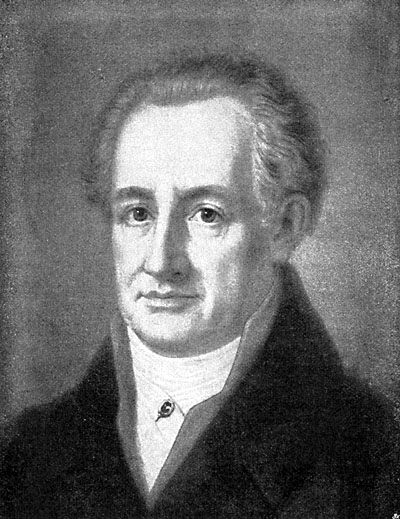
Goethe in 1811-CE, age 52
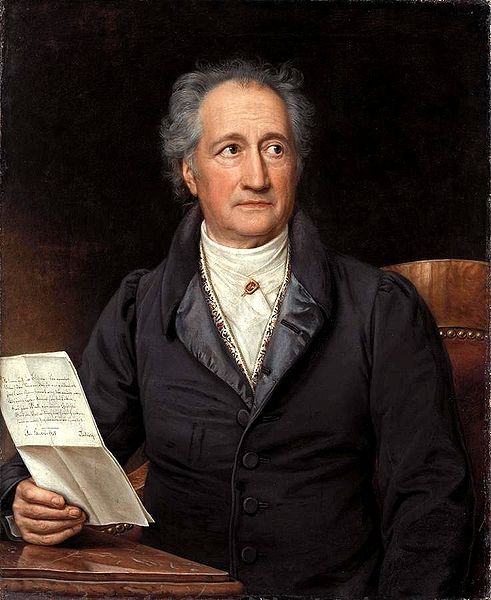
Goethe Johann [age 79] painted by Stieler, 1828

polymath
poet - dramatist - philosopher
theorist of physical science
scientific illustrator
author of Die Leiden des jungen Werthers ++ Faust
Earth-birth = Thurs-28-Aug-1749
bio-decease = 22-Mar-1832 [age 82]
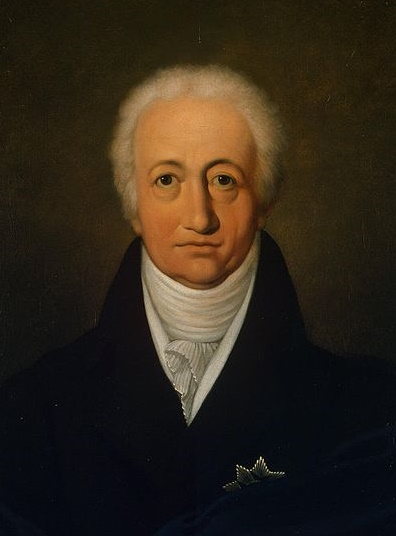
Goethe by von Ferdinand, 1818-CE
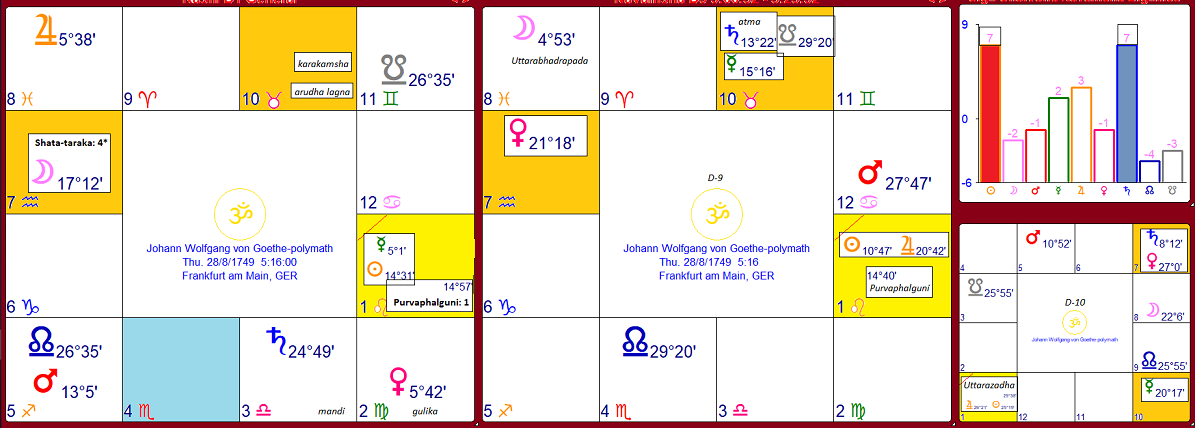
Johann Wolfgang von Goethe
1749-1832
polymath
politician + philosopher
illustrator
popular songwriter + poet
birth data from en.wikipedia.org/wiki/Johann_Wolfgang_von_Goethe
tentatively rectified by BP Lama
Jyotishavidya
charts + graphs + tables = produced by Shri Jyoti Star - www.vedicsoftware.com
- adapted by BP Lama
Rising Nakshatra
Masculine Nativity
Yoni - Bhagadaivata - Prakphalguni - Arjuni
BPL COMMENTARY
For Pūrvaphalgunī - Yoni - births of a masculine valence, the condition of sweetly musical, artistic, harmony-seeking, negotiating, balancing, arranging, designing, matching, pairing, sensually pleasuring akarshana-karaka Bright Beautiful Bhrigu may considerably affect the outcome.
Due to the definitive influence of kalatra-karaka Shukra, gentlemen born into the realms of Bharani - Yamya, Pūrvaphalgunī - Yonī, or Pūrvāṣāḍhā may find that their life-understanding is greatly shaped by the character of the feminine companions.
For those born into the Shukra-ruled paradigm of Vutavabana, feminine figures such as sisters, aunts, and wives, along with partnerships, contracts, bargains, sensual pleasures, lovers, artistic beauty, luxurious scents, treasuries, financial arrangements, and music , may be especially influential.
Instructional guidance provided by emissaries from the civilizations of Zosma. their purpose is to dramatize, glamorize, and politicize the grand theatrical values of creative life.
Diplomatic charm
[Sweetly Suave Shukra] -ruled Pūrvaphalgunī gentlemen are often found in the sparkling bright worlds of politics , romantic idealism, entertainment, speculative finance, and spectator sports. Yoni-born chaps often display a thick mane of leonine hair and a charming sense of humor.
They are happiest when enjoying a choreographed sport, playing music, dancing with agility and grace, or performing a richly costumed dramatic role for an appreciative audience, delighted by spectacle and applause, they glitter and smile at parties, political campaigns, gambling and games..
Depending upon the placements of dhanakaraka Shukra and dhana=pati Budha, the Purvarjuni-born may also excel in financial showmanship, bargaining toward a political or commercial agreement, and the high drama of romantic relationships.
Like all Shukra-governed births, bhagadaivata-born must take care to avoid the misuse of drugs and alcohol. Political success depends upon the charisma of lagnesha Surya. Financial success depends upon the dual-dhanakaraka Shukra and Budha.
Themes of political celebrity, lavish musical entertainments, arts and fashion, and financial agreements may contextualize Pubba's terrestrial experience. Applies also to Chandra-Pūrvaphalgunī.
QUOTATION Pūrvaphalgunī
from Shil-Ponde. (1939). Hindu Astrology Joytisha-Shastra. p 83
" A physical rather than a mental type.
-
A healthy constitution
-
not given to worry or anxiety regarding the problems of living.
He must guard against impulsiveness
since he is apt to to act without sufficient thought
-
and as a result he makes many mistakes
-
which are difficult to rectify
-
and which may be disastrous .
He is very active physically and will be proficient at various sports
-
reveling in the joy of mere action,
-
even purposeless action.
These people seem never to rest and are constantly in motion.
-
As soon as they have finished one thing they start on another,
-
frequently doing several things at a time."
[end quote, Shil Pondey, 1939]
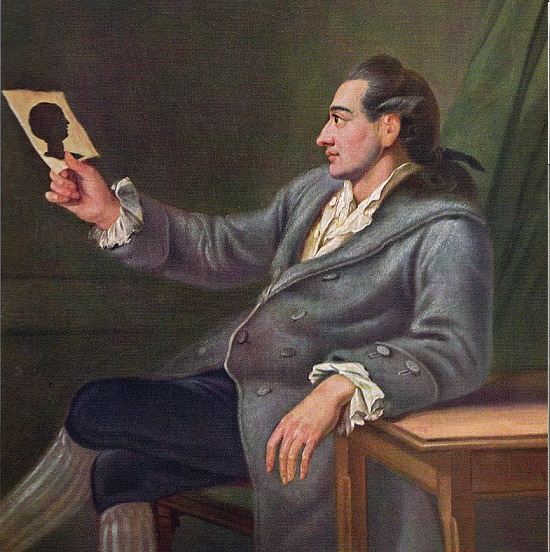
Goethe Narcissist [age 26] painted 1775 by Georg Melchior Kraus
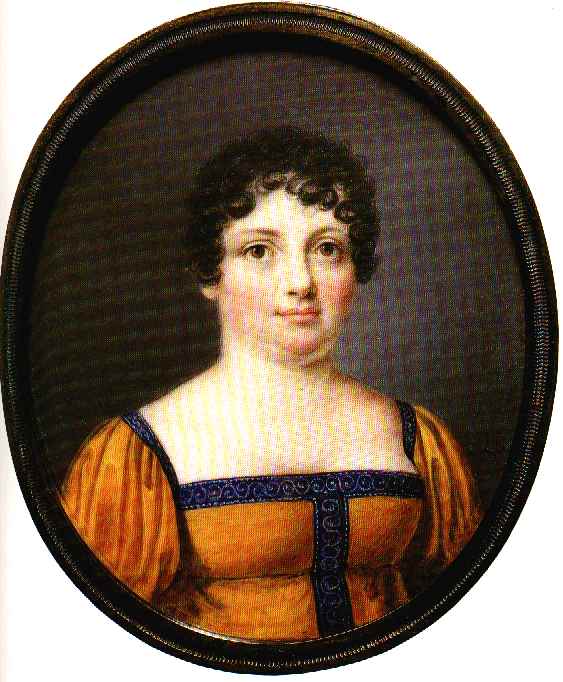
Christiane Vulpius of Weimar, lifepartner of J.W. von Goethe
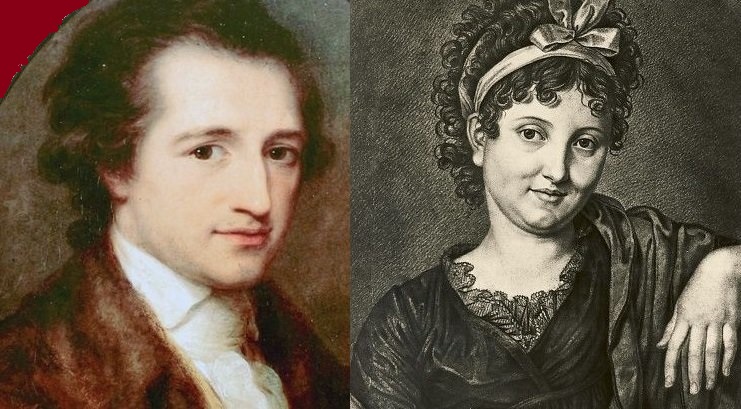
JWG and his lifepartner, Christiane Vulpius of Weimar
Biographical events matched to the Vimshottari Dasha calendar
-
Faust 1749-1832 polymath Johann Wolfgang von Goethe
[Rahu Mahadasha] [age birth until age 3.8]
-
[Rahu-Dhanus] = [Rahu in bhava-5] + [Pūrvāṣāḍhā-Rahu-yuti-Mangala-Mūla]
[Guru Mahadasha] = [age 3.8 until age 19.8]
-
[Guru-Meena] = [Guru in bhava-8]
Thu-28-Aug-1749 = Earth-birth in Frankfurt am Main, Hesse, Germany * Guru-Guru svabhukti
[Shani Mahadasha] = [age 19.8 until age 38.8]
-
[Shani-Tula] = [Shani in Bhava-3]
1767 [JWG age 18] retreat from the dominance of the father * Shani-Shani svabhukti * Shani rules 6th-from-Surya
1768-69 [JWG age 18-19] severe illness while a young adult student * Shani-Budha bhukti * Budha rules 12-withdrawal, isolation
Aug-1771 [JWG age 21] obtains lawyers Lizenziat [Licentia docendi] in Frankfurt and begins a law-practice * Shani-Shukra bhukti * Shukra lagnesha
1774 [JWG age 24] produces his most famous work * Die Leiden des jungen Werthers = The Sorrows of Young Werther * Shani-Shukra bhukti * Shukra lagnesha
1775 [JWG age 25] romance and engagement to Lili Schoenemann, but the engagement "lapses" after months of traveling * Shani-Chandra bhukti * Chandra rules 6th-from-Chandra emotional conflict
25-May-1782 [JWG age 32] grieved bio-decease of father
* Shani-Guru chidra-dasha
[end of an era]
* Guru rules 7th-from-pitribhava
[Budha Mahadasha] = [age 38.8 until age 55.8]
-
[Budha-Simha] = [Budha in bhava-1] + [Pūrvaphalgunī-Surya-yuti-Budha-Magha]
12-July-1788 [JWG age 38] Goethe and Christiane Vulpius meet for the first time. The daughter of a dismissed Weimar archivist-copyist, 23-yo Vulpius came to Goethe's office to plead for financial patronage for her brother, an aspiring writer. * Budha-Shukra bhukti * Shukra attraction, finance
1788 [JWG age 38] Goethe and folk-muse Christiane Vulpius become cohabiting domestic partners. Christiane's sister and her aunt also join the home. The proper ladies of Weimar are scandalized, so the happy household moves from center-city into the outerskirts of town. * Budha-Shukra bhukti * Shukra randhresha, identity-change
25-Dec-1789 [JWG age 39] celebrated the birth of child-1, Julius August Walther von Goethe . Four additional children would be born into the union, but only August survived past childhood. * Budha-Surya bhukti * [Surya-yuti-Budha] Budha activates 9 + 9th-from-Chandra ++ samchara R-K Tula-Mesha contact navamsha Chandra-Mesha
[Ketu Mahadasha] = [age 55.8 until age 62.8]
1806 [JWG age 56] catastrophic home invasion by French militia during the invasive wars of Napoleon Bonaparte. According to Goethe, his extraordinary lifepartner Christiane bravely protected the homestead and the destruction of their home was avoided. * Ketu-Budha chidra-dasha * Budha rules 6th-from-4, harm to home
19-Oct-1806 [JWG age 57] following seventeen years of shared homelife, ceremonial consecration of marriage 1-of-1 with Christiane Vulpius, at the Jakobskirche in Weimar. Ketu-Budha chidra-dasha * Budha rules Kanya 7th navamsha ++ samchara R-K Dhanus-Mithuna contact natal R-K
[Shukra Mahadasha] = [age 62.8 until age 82.8]
-
[Shukra-Kanya] = [Shukra-2]
13-Sep-1808 [JWG age 58] grieved bio-decease of beloved mother* Shukra-Shukra svabhukti * Shukra rules 4th-from-Chandra = burial of elderly parent
1815 [JWG age 63] Christiane suffers a stroke, followed by crippling pain of renal failure * Shukra-Rahu bhukti
06-Jun-1816 [JWG age 64] grieved the bio-decease of wife Christiane Vulpius. She is buried in the Jakobskirche where the pair had been married. However, Goethe did not attend the church funeral. * Shukra-Rahu bhukti
-
[Surya-Simha] = [Surya in bhava-1] + [Pūrvaphalgunī-Surya-yuti-Budha-Magha]
28-Oct-1830 [JWG age 78] death of Goethe's only surviving child, son Julius August * Surya-Shani bhukti * Shani rules 12th-from-putrabhava
22-Mar-1832 [JWG age 82] blessed liberation from the Earthen-body * Surya-Ketu bhukti * Ketu chidrakaraka
Distinctive Features of the Nativity
-
Faust 1749-1832 polymath Johann Wolfgang von Goethe
[Sparkling Splendid Surya]
pitri-karaka [father] -- jyoti-karaka [light]
[energizing-identifying lagnesha for Simha indriya-lagna]
[bright center of romantic games]
[radiates self-referential confidence]
[identified lagnesha with center-stage entitlements]
[dramatization of embodied lagnesha creative intelligence]
[celebrated tangible appearance enacts royal entitlements]
[politicized father-figure may be sparkling personality, physically demonstrative, flamboyant idealist]
...
[political-ceremonial Pūrvaphalgunī-1] = [vargottamsha] [navamsha Surya-Simha] intuitively confident dramatized flamboyant self-central display
[Pūrvaphalgunī-Surya-yuti-Budha-Magha]-
[Surya-Simha] Khaga * Khagaya - air-moving * brightly charismatic confidence of Center-stage Surya radiates through the regally entitled sparkling displaying game-playing rashi of Surya
-
[Surya in bhava-1] center of identity * bright embodiment * intelligence for competition * focus on appearance * genius for innovative self-expression * athletic entitlements * glittering warmth of personal charm * sparkling center of body-based vitality * self-referential father may be icon of entitlement, brilliant competitor, political pioneer
-
[Surya-yuti-Budha] confidently conversational * brightly explaining messenger * entitled to discuss * creatively intelligent sibling-cohort * discursive father-figure * gestures conduct the spiritual rays of the Sun * radiantly descriptive * articulate in drama * skillful game-player * self-confident announcements * talks about ideals * narrative of power-politics * recites love poems * describes divine romance
OUTCOMES - MAGNIFICENT MARTANDA
self-reflexively confident, bright Earthen-body aura, regal style of movement, embodied intelligence, radiantly kinetic, politically competitive, splendidly innovative [Surya in bhava-1] rules
-
1- distinctive attributes of personality, dense material incorporation, individual personification, earthen embodiment, physical integrity, kinetic energy, dance, style of movement, athletic prowess, muscular mobility, unique character, kinetic vitality, circumstances of birth, forward push, tangible appearance, coherent social identity
CAREER - SPARKLING SURYA
a polymath writer-illustrator-scientist whose researches into nature and human character covered a broad scope. A brilliant literary figure.
radiantly confident political-dramatic [Surya in bhava-1] rules
- 1- personality, appearance, embodiment, social-attribute package
Goethe = voluble [Surya-yuti-Budha] man-about-town in Weimar, alegendary social-intellectual capital in WG's day.
Weimar attracted talented people from throughout Europe. Goethe was born into the privileged classes and he held professional roles as a high-ranking court officer
Throughout his life, Goethe needed to negotiate a very challenging combination of a super-strong administrative [uchcha] = [Shani in Bhava-3] and a super-strong creative Surya in bhava-1. These graha facilitate writing and publishing, governance and management, along with other graha which articulate his remarkable range of talents and skills.
FATHER
Dad = town manager, documenter and report-writer [Surya-yuti-Budha] ++ as a recognized leader and politician. Dad had a large presence Surya in bhava-1 amplified by drishti from Rahu-5. Attorney father had an imposing influence upon Goethe.
A burning-strong Surya-Simha receiving the incoming drishti from Rahu-Dhanus-5 made Goethe a famous creative figure. His literary writings were continuously popular from in his own day without lapse until the present time.
[Surya-yuti-Budha] shows Goethe's own capacity for administration-management.
[Comfortable Caretaking
Chandra]
matrikaraka [mother] -- garha-karaka [village]
[retreating-contemplative vyaya-pati for Simha indriya-lagna]
- check Shani + Shani-drishti to source Chandra's soberly friendly feelings, structured community rhythms, orderly mass-participation sensibilities
[intangible sensitivity to equity in the populist marketplace]
[comforted by relationship with goal-achieving privacy-seeking mother]
[soothed by invisible partnership in mass-participation events]
[culturally attuned to community connections]
[needs to feel friendly pulse of associative ritual ordering]
[protector of private economic agreements]
- Soma-rules 12-imagination = emotionally-distressed, sensitive-to-conflicted imbalance 6th-from-Chandra. Tendency to retreat into fantasy about perceived animosity, especially marital
[environmentalist feelings attuned to local air-element deva]
[revenue-earning mother may be popular middleman-arranger, fundraising representative, socialite harmonizer, interlinked advisor]
...
[visionary-charitable Vāruṇa-4] = [navamsha Chandra-Meena] intuitively sensitive imaginative wholistic symbolic understanding
= [Pushkara pada]
-
[Chandra-Kumbha] comforted by friendship * sensitive to mass-participation gridworks * needs marketplace connection
-
[Chandra in Sadachbia - Varuna] calmed by mixed networks * protectors of universal mingling * soothed by risky marketplaces * needs to make expedient social connections
-
[Chandra in classroom-7] comfortable with arrangements * familiar with sensitive arbitration * needs ancestral harmony * soothed by match-making * feels the pulse of trading exchange * allied to the advisor-mother * accustomed to ritual adjudication * habitual negotiator * calmed by customary counseling * needs cycles of rhythmic emotional rebalancing * seeks contractual equity * sheltered by a parenting partner * nourished by undulating agreements * brokering mother may be an intuitive go-between, diplomat, attorney, mediator, meddler
OUTCOMES - ANCESTRAL SOMA
sensitively adjusting, protectively harmonious, routinely bargaining, parentally equalizing, rhythmically arranging, customary middleman, predictably meddling, culturally agreeable, emotionally adjudicating, needs to hold mediating positions [Chandra in classroom-7] rules
-
12 enclosures, the bed, fantasies, privacy, interior spiritual guidance, clandestine undertakings, intuitive awareness, non-linear conceptual undertanding, concealment, seclusion, invisibility, dissolved identity, meditation, contemplation, dreamworlds, astral plane, imaginary scenarios, sanctuary sleep, distant lands, distress of the avowed partner
CAREER - CARETAKING CHANDRA
-
[folk-reputation 10th-from-Chandra = land-ownership, patriotism, ethnicity, familiar rhythms, cultural foundations, defense of a way-of-life in the mysterious, secretive, erupting, occulted, initiating style of Vṛścika-4]
Goethe was not only a scientist [Kumbha] and philosopher Chandra in Pūrvābhādra .
JWG was also the songwriter of numerous bawdy German folk melodramas that were wildly popular and performed in village taverns.
Many of his dramatic works are written for an earthy, non-literate audience due to Chandra's ruler, Shani-Tula
= [uchcha] in bhava-3 writing. These comic-tragic tales of village life provided an outlet for his imagination [Chandra activates 12] and established him as a familiar German cultural icon.[Chandra]
Chandra = folkways. Goethe wrote countless bawdy tavern songs, and more formal lyrical poems too. Goethe = serious scholar in many fields and he had the discipline Shani-Tula to produce voluminous documentation. In addition he was said to be a chatterbox Budha in bhava-1 [dikbala] showing delight in spoken language, dialect pronunciations, and local twang.
During the intervening two centuries, science has advanced while basic human consciousness has not. Over time, Goethe's drama and poetry have outperformed his abundant scientific works Chandra in Shata-taraka. Yet even the older scientific drawings are still admired for their detailed accuracy and stylistic beauty.
MOTHER
Catharina Elisabeth Goethe, born Catharina Elisabeth Textor, (19 February 1731 – 13 September 1808) was the mother of German playwright and poet Johann Wolfgang von Goethe and his sister Cornelia Schlosser. She was also known by the nickname Frau Aja and the title Frau Rat. Contents
Born: Catharina Elisabeth Textor, 19 February 1731, frankfurt
Children: Johann Wolfgang von Goethe (son), cornelia Goethe (daughter)
Died: 13 September 1808 (aged 77), frankfurt
Spouse: Johann Caspar Goethe
MARRIAGE partnership emotional equity support expectations
Johanna Christiana Sophie Vulpius was born in Weimar, 01-Jun-1765 and died in Weimar 06-Jun-1816 [her age 51). Christiane was the non-exclusive life-partner and after 14-Oct-1806 the legal wife of Johann Wolfgang Goethe. She was the mother of his five born children [only one child survived to adulthood).
For a husbandly Learner, kalatra-karaka
= [nīcha] shukra suggests some illness or servitude of the spouse and Generally, imbalance-seeking-a-remedy in marriage
- bhava-1 containing Budha-Simha yuti [Surya-Simha]
- suggesting that Christina deeply supported Goethe's [creativity [Simha] and love of entertainments [Simha] including his numerous romantic endeavors
- Goethe referred to Christina as his muse. He found her irreplaceable, and was not concerned with public opinion about her social status.
[Competitive Champion Kuja]
bhratru-karaka [brother] -- virya-karaka [virility]
[Yogakaraka homebound-securing bandesha for Simha indriya-lagna]
[Yogakaraka doctrinal-believing dharmesha for Simha indriya-lagna]
- check Guru + Guru-drishti to source Kuja's vitally principled, kineticly enthusiastic pushy, doctrinally guided actions
[vigorously ideological political campaigns]
[energetic inspirationally optimistic stage performance]
[dynamic theatrical enactment of priestly righteousness]
[expresses dramatic creativity with guidance teachings]
[promotes demonstrations of paradigmatic belief]
[praised for pro-active patronage]
[physicalized drive to preach the catechism while playing romantic poetic games]
[may battle over sacerdotal entitlements with one's own children or students]
[athletic coaching boosts adolescent confidence]
...
[rhythmic-ethnic Mūla-4] = [navamsha Kuja-Karkata-nīcha ] defensively-pursuing familiar protections+ [Mūla-Kuja-yuti-Rahu-Pūrvāṣāḍhā]
-
[Mangala-Dhanus] vigorous development of humanistic worldview * energized inspiration * thrust toward doctrinal expansion * proactive teaching-preaching * promotes philosophical globalism * champion of broad understanding * pursues patronage
-
[Mangala in bhava-5] drive toward creativity * pursues games of chance * pioneering speculation * dynamic style of flamboyant display * competitive children * energized by intellectual gambles * political conquests * productive intelligence * push toward celebrity * champion of romance * promotes choice-making *propulsive genius * actively charming *
-
[Kuja-yuti-Rahu] thrill of muscular action * competitive ambition * passion to win * fascinating physicality * compulsive drive toward heroic battle * dynamic desires * champion of culture-clash * forward thrust toward opportunity * forceful pursuit of privilege
OUTCOMES - MOVING MANGALA
energetic center-stage performer, brightly kinetic dramatist, champion of romantic pursuit, vigorously gambling, dynamically creative, competitively political, sparkling entertainer, pioneering displays, dominant winner in gambling and games [Mangala in bhava-5] rules
-
4 cultural foundations, property boundaries, way of Life, protection, defense , homeland, household, routines, rituals, mother, parents, customary rhythms, caretakers, socialization schooling, gardens, waterways, transportation, housing, social security, sense of place, environmentalism, citizenship, belonging, ethnic basis, ethno-religion, patriotism, real-estate, farming, land-ownership, burial, predictability, health of the elder sibling
-
9-ideology , paradigm of belief, profession of faith, principled convictions, higher understanding, father-figures, priestly patronage, preaching, patriarchal entitlements, philosophical convictions, theory, public spiritual guidance, celebrated doctrines, sangha, sacred teachings, credenda, globalism, dharma, worldview, weltanschauung, mother's health
CAREER - MOTIVATED MANGALA
JWG's dramatic masterpiece = Faust. This tale of all-too-human folly and greed is often required reading for undergraduate literature classes. Faust has kept a wide appeal to Euro-culture audiences for more than two centuries.
The creative, political, philosophical pair Mangala-yuti-Rahu-5 occupy the emotionally associative, community-linking, economically gainful, profit-regulated, friendly, participatory, goal-oriented, socially-networked 11th-from-Chandra
Goethe's brotherly [Kuja] friendship with Karl August, duke of Saxe-Weimar-Eisenac provided most of his income [11] and prestige opportunities [Rahu] via politicized administrative and managerial appointments to various government projects [3rd-from-3rd).
It was the royal [5] Karl August's belief [Dhanus] in Goethe's wide-ranging talents that allowed Goethe to rise both socially and financially.
yogakaraka + Mangala-Dhanus * [Mangala in bhava-5] rules 4-patriotism ++ 9-philosophy.
Although Mangala-Dhanus will generally bring the energetic, dynamic movement of [Mangala in bhava-5] into the world of creative literature and celebrity politics [5), in his capacity as ruler of bandhu-4 Mangala also allows the excitement of home-invasion [1806] by French soldiers
[Busy Bantering Budha]
jamayah-karaka [sibling] -- sandesha-karaka [message] -- shisya-karaka [student]
= [dikbala]
[historical-evaluating dhana-pati for Simha indriya-lagna]
[profitable-friendly labha-pati for Simha indriya-lagna]
-
check Surya + Surya-drishti to source Budha's willful dialogs, solipsistic interpretations, center-stage discourse
[Dhanayoga = Budha-1 rules 2 + 11]
[enriching dhana-pati narrative of physically self-directed romantic amusements]
[explains entitled accounting for entertainment business]
[describes personalized pageantry and showcasing instructions]
[tallks about the details of politics and drama]
[gainful labha-pati communication about creative artistic performance]
[announces authorship information]
[gambling sibling-cousin may be theatrical-manager, idealistic administrator, neighborly demonstrator]
...
[financial-heritage Magha-2] = [navamsha Budha-Urisha] intuitively detailed-explanatory stories use historical sound-color values
+ [Magha-Budha-yuti-Surya-Pūrvaphalgunī]
-
[Budha-Simha] political communications * articulation of unique creativity * delivers celebratory announcements * manufacturers bright displays * explains celebrity entitlements * romantic messages * declares poetic adoration * delights in glittering phrases * manages entertainments * details the procedure for theatrical amusements * speaks with royal flamboyance * talks about gambling * plays intelligent games * hands-arms-shoulders send dramatic gestures
-
[Budha in bhava-1] narrative of embodiment * bifurcated self-image * discusses physical appearance * describer of embodiment * explainer of tangible self * delivers instructions for self-characterization * articulation of communicative movement * animated gestures * talks about personality * details the two-sided identity
-
[Budha-yuti-Surya] illuminating explanations * entertaining chatter * central roles in communication * brightly clear descriptions * dramatic enunciation * confidently delivers instruction * articulation of radiant certainty * political messenger * talkative father-figures
OUTCOMES - BANTERING BUDHA
cleverly conversational personality, embodied detailed communications, physically vigorous moving talk, identified with gesticulation, uniquely energetic innovative explanations, kinetic mentalized manager, busily delivering instructions, acts like a mercantile scheduler-planner [Budha in bhava-1] rules
-
2-acquisition, family legacy, tradition, language-lexicon, preserved memory, banking, collections, entreasurement, herd-hoard, treasury containment, financial capital, accrued amounts, asset evaluation, knowledge of history, speech-song, heritage values, color-sound, arts-and-music, face-voice-eyes-teeth-mouth-hair, genetics, stored resources, health of the father
-
11-fruitful revenues, interconnected income, profits, material achievement, social networking, friendships, community linkage, fan-clubs, mass participation gatherings, collectivism, marketplace gridworks, distribution, association, populism, economic systems, fundraising, gains-and-goals, awards for work accomplished, health of the enemies
CAREER - BUSY BUDHA
[Dhanayoga = Budha-1 rules 2 + 11]
His various income opportunities were mainly framed as writing, publication, administration, and teamwork projects = Budha.
[Generous Growing Guru]
dhava-karaka [husband] -- bahuta-karaka [variety] = [svakshetra]
= [svakshetra]
[witty-creative vidya-pati for Simha indriya-lagna]
[mysterious-revealing randhresha for Simha indriya-lagna]
[transformative faith opens interior spiritual guidance]
[broadly multi-dimensional apertures may psychicly channel hidden randhresha discoveries]
[numerous cheerful clairsentient initiation permissions]
[philosophy of secrecy randhresha maintains fantasy celebrity status vidya-pati]
[permissive romances vidya-pati hide behind mask of visionary worldview]
[wholistic ideology broadens healing empowerments]
[private life-principles guide undisclosed interventions]
[many large astral emergencies]
[symbolic understanding of meditative imagery allows revolutionary change]
[camouflaged operatives may develope cetacean intelligence vidya-pati]
[for wifely Learners, contemplative husbandly-companion may be disguised dream-time way-shower]
...
[dramatizing-creative Andromeda-1] = [navamsha Guru-Simha]
-
[Guru-Meena] much sleep * theoretical understanding * broad inner guidance * optimistic imaginings * propagation of symbolic wisdom * inspirational dreams * intuitive beliefs * doctrine of esoteric understandings * expands the scope of contemplative awareness * multiple prayers * permission to envision
-
[Guru in bhava-8] greatly optimistic rejuvenation * many sudden beneficial changes * keeps many wise confidences * faith in rebirth * numerous identity transformations * generous in-laws * extensive tantric understanding * expansion of undisclosed forces * abundance of initiations * many mysteries * regenerative emergencies * secret philosophical guidance * hidden inspiration * believes in invasive healing * rebirth via multiple surgeries * In the nativity of a Wifely Learner, , husbandly-companion may be a revolutionary, disaster-responder, or trauma-healer
OUTCOMES - GENEROUS GURU
generously disguised, hidden patrons, expansively veiled, cheerfully non-disclosing, doctrinally opaque, many surgeries, multiple emergencies, believes in healing, guidance via secret initiation, mystically transformative, inspirationally recycling, jovially rebirthing, optimisticly discovering, suddenly extensively eruptive [Guru in bhava-8] rules
-
5- Politics, center-stage roles, theatre, demonstration, display, charming brilliance, genius, poetry, choice-making, showmanship, gambling and gamesmanship, romantic idealism, creativity, fashion-shows, flamboyance, celebrity entitlements, confidence, artistic performance, drama, children, financial speculation, intelligence, entertainments, fun
-
8-unexpected eruptions of regenerating force, occult initiation, mystical revelation, shocking intervention, opaque empowerments, invasive surgery, intensive healing, evolution, violent explosion, sudden identity change, rejuvenation, recycling, rebirth, hidden assets, upheaval, undisclosed secrets, transformative events, discovery, in-laws of first marriage, health of younger sibling-cousin
CAREER - BENEVOLENT BRIHASPATI
[Guru-Meena] in 2nd-from-Chandra suggests birth-family affluence. Goethe was raised in bourgeois comfort by his town-manager dad and educated mother.
[Guru in bhava-8] -Meena expansion rules the creative, ambitious Mangala-yuti-Rahu-5 ++ secretive, healing Meena -8
[Guru in bhava-8] = multiple identity transformations
- JWG was known as a literati, agovernment administrator, an attorney, ascientific illustrator, aromantic lover, and numerous other identities
Randhresha Guru-5 is stressful for children. Goethe had five children with Christiane Vulpius, but only their eldest son survived to adulthood.
Goethe's surviving son Julius August Walther von Goethe was born in 1789 [Goethe's age 40). Goethe's marriage to his son's mother Christiane Vulpius occurred in 1806 [Goethe's age 57). His son was obliged to live with the bourgeois stigma of illegitimacy for seventeen years. Julius August Walther von Goethe, the only surviving son predeceased his father.
Yet Guru-Meena -8 is financially well-placed in 2nd-from-Chandra, and the senior Goethe arranged favorable positions for the junior Goethe.
Goethe = recognized polymath who displayed a stunning variety of artistic, literary, scientific, and legal talents.. While Goethe's secrets were many, his public side was dramatic and inspiring Mangala-yuti-Rahu-Dhanus . His works were celebrated as peak examples of German wisdom, philosophy, teaching, and numerous diverse expressions of understanding. Goethe demonstrated his genius via an astounding variety of connected fields of study.
- According to wikipedia, these included "epic and lyric poetry written in a variety of metres and styles prose and verse dramas memoirs an autobiography literary and aesthetic criticism treatises on botany, anatomy, and colour and four novels. In addition, numerous literary and scientific fragments, more than 10,000 letters, and nearly 3,000 drawings by him are extant."
- en.wikipedia.org/wiki/Johann_Wolfgang_von_Goethe
[Sweetly Suave Shukra]
svadu-karaka [sweet] -- kalatra-karaka [wifely companion] = [ [nīcha] = [svabhava]
[dutiful-hierarchical karmesha for Simha indriya-lagna]
[busy-messaging vikrama-pati for Simha indriya-lagna]
- check Budha + Budha-drishti to source Shukra's calculated bargaining, analytical advocacy, assistive representation
...
[populist-connected Aryaman-3] = [navamsha Shukra-Kumbha]
-
[Shukra-Kanya] appreciation of service ministries * likes logical argument * attracted to subordinates * delighted by animals * accepts unbalanced agreements * prefers exploitable partners * pleased by pain relief * enjoys humility * graciously accommodates unfair contracts * sweet alliance with victims * litigious bargaining
-
[Shukra-2] seeks pleasure via gathered treasuries * enjoys banked assets * bargains toward collected equity * feminine-figures predominate the family * gracious storyteller * pretty preservations * balanced linguistic expression * beautiful voice * pleasing designs to adorn the face * aesthetics of mouth + jaw + teeth + hair * graceful neck * prefers historical values * appreciation of speech-and-song * for husbandly Learners, wifely-companion may be banker, collector, historian, preserver
OUTCOMES - SWEETENING SHUKRA
sensually acquisitive, appreciates artistic traditions, harmoniously speaking, historical aesthetics, finances from mother-and-father, lovely eyes, musical feminine-figures, beautiful collections, family-based relationships Shukra-2] rules
-
3-communications, messaging, sermons, scripts, radio-television, media-products, Writing and Publishing, letters of correspondence, announcements, planning, schedules, sales, marketing, documentation, reporting, cohort, entourage, committee-work, iterative stepwise process, manufacturing, commercial business, instruction, explanation, discussion, diagrams, labeling, event management, signage, training, itinerary, tours
-
10-career, profession, dignity, regulatory roles, governance duties, social authority, symbolic recognition, iconic visibility, leadership responsibility, top status, reputation, commanding positions, honor, high regard, public respect, executive power, elite rank, lawful imposition, organizational director
CAREER - BRIGHT BHRIGU-TANAYA
Relationships
- Learning Pathway experiences may involve feminine-figures who are deceived, disadvantaged, marginalized, or suffering from low self-worth [Kanya 12th-from-balancing Tula].
- Partnerships personal and professional may be challenged in matters of equity, fairness, mutuality, balance
- Attracted to servants, employees, service-workers, helpers, and aides.
- Aesthetic of exploitation.
- Often displeased with peers.
[Shukra-Kanya] = [nīcha] occupies the secretive the revolutionary, emotionally turbulent, perpetually transformative, trauma-inducing, discovering, revealing, danger-seeking 8th-from-Chandra . Goethe's romantic adventures and misadventures were also celebrated, as he seemed to eschew conventional relationship conduct while becoming a Weimar favorite ladies' man.
Shukra is also responsible for the orderly aspect of JWG's governance career.
- Shukra activates kārakāmsha = bhava-10 governance duties
- Shukra activates Arudha lagna = bhava-10 governance duties
- Shukra activates [10th navamsha] containing Shani + Budha + Ketu= career in song, art, governance
Lifepartnership
[Shukra-Kanya] suggests that Goethe's wife needed to be a service-class woman not a fragile woman like Lili with whom he dissolved engagement in Shani-Ketu bhukti. Finally married Christiane the house-servant and artists model, 31 years later in 1806 and they produced five children.
Goethe's amorous lifestyle was accepted by his peers. Shukra-Kanya suggests marriage with a servant-figure or one committed to a ministry of service. His wife Christiane Vulpius = strong and capable housekeeper. She boasted neither social nor intellectual pretensions.
Despite Christiane hailing from a much lower [considered vulgar] social register, after 19 years of being unlicensed lovers, Goethe married her at his age 57.
An earthy woman who = house-servant and artist's nude model, christiane was apparently very strong. Goethe boasted to everyone that Christiane had counter-attacked marauding soldiers who threatened their home and their children.
Shukra in the secretive, revolutionary, emotionally turbulent, perpetually transformative, trauma-inducing 8th-from-Chandra . Goethe's socially conscious mother [Chandra-7] was horrified at his marriage, and died soon after their wedding. They remained married until Christiane's own death ten years later.
= [nīcha] = [Shukra-2] rules 3-writing + 10-governance
= [nīcha] shukra * Despite his dignified job and high-placed friends, Goethe was prone to writing and enacting bawdy, salt-of-the-earth musical melodrama. He broke marriage-engagement contracts. He consorted with ladies of diverse reputation. He was generally a man-about-town.
His amorous affairs and in particular his marriage to a servant woman Shukra-Kanya caused consternation among his bourgeois peerage. However Goethe's literary reputation has steadily increased over the centuries, due mainly to Shani-[uchcha] 3 which maintains the appreciation value of written works.
[Sober Structural Shani]
duro-karaka [endurance] -- jara-karaka [Jahre, years]
= [uchcha]
[inimical-medicating rogesha for Simha indriya-lagna]
[balancing-bargaining yuvati-pati for Simha indriya-lagna]
- check Shukra + Shukra-drishti to source Shani's rigidly harmonizing, fairly adjudicating, reciprocally orderly systems
[obligation to message about the tenets of equity]
[must report upon deals and exchanges]
[drafty pastel-colored parlors]
[cautiously judging cohort]
[must balance structured complaining rogesha discussions about fairness]
[slow impartial model for daily business]
[lawfully arranged scheduling itineraries]
[strict but adjustable mental regulation]
[sober scripted bargaining conversations yuvati-pati]
[responsible for maintaining simplified communication for the allies]
[must patiently negotiatiate partnerships]
[stodgy middleman sibling-cousin or collegial team-mate may be brokerage instructor, trading merchant, mediating manager]
[disagreements cautiously diplomaticly managed]
...
[evaluating-historical Viśākha-2] = [navamsha Shani-Urisha]
[ātmakāraka duty, the burden of responsibility, class-hierarchies, social-stratification, structure, law, science]
-
[Shani-Tula] overburdened agreements * restricted leverage * mandatory bargaining * strict rules for making agreements * structural compression upon kidney-pancreas * rigidly regulated match-making * must form socially approved partnerships * must honor the lowest-common-denominator in deal-making * mandatory fairness * must normalize social justice * unyielding obligatory diplomacy * must advocate for equity * exchanges must be lawful * must continue conventional negotiations * scarce trading resources * maintainer of old bargains
-
[Shani in Bhava-3] steady time-structured dialogue * heavy responsibility for business * obstructionist younger siblings * disciplined handwork - required writing * must message * obliged to explain * cautious instructions * orderly teamwork * tense interactions * communicative fatigue * chronic sadness * stops spontaneous announcements * mental depression due to old repeating thoughts * may limit the hearing * tight time management * regulated schedules * elders preserve materialistic mentality
OUTCOMES - STRUCTURAL SHANI
soberly commercial, class-conscious administrator, regulatory documentor, responsible for orderly business, maintains stepwise bureaucratic process, applies strict reporting standards, mentally constricted, lawfully managerial, pragmatically instructional [Shani in Bhava-3]
-
6-ministries of service, dehumanization, misconduct, war, jail, slavery, pollution, argumentation, healthcare workers, ailment, injury, medical treatment, hypocrisy, crime, cheating, animosity, toxins, complaints, accusation, litigation, imbalanced conditions, injustice, betrayed promises, servants, laborers, hostility, animosity, disagreement, dehumanization
-
7-covenant, promise, trust, contractual relationships, social justice, advocacy, legal judgments, lawcourts, appeals, representation, equity, diplomacy, partners, justice, marriage, legal and formal partnerships, negotiation, alliance-crafting, match-making, fair arrangements, even deals, advocacy, trading, bargaining, brokerage, haggling, go-between, middleman, meddler
CAREER - SOBER SHANI
Shani activates 7-diplomacy ++ 6-conflict.
Among his other skills, Goethe = professional diplomat and representative of the royal court
[Shani in Bhava-3] occupies the elder-respecting, old-faith, strict philosophies, punitive, scarcity-preaching 9th-from-Chandra
Enduring Literary Legacy
Most of Goethe's literary oeuvre is still in print, 250 years after he produced it. His poetic writings continue to influence the minds of each new generation of dedicated readers. Goethe - especially Faust - is read by university students and by intellectuals who specialize in the study of European culture. It is common to hear non-German intellectuals declare that they undertook the study of the German language solely for the purpose of reading Goethe!
- Goethe's style and ideals provided a major influence upon the work of Knowledge of Higher Worlds 1861-1925 Rudolf Steiner who was the founder of Anthroposophy.
However, not everyone is equally enamored of Goethe's style.
- The American leader POTUS-03 Declaration of Independence 1743-1826 Thomas Jefferson = contemporary of Goethe, and Jefferson had traveled in Germany. Replying to a peer who asked whether he had read Goethe, Jefferson reportedly said, " Never!"
Goethe = dignified agent of the social order, and his governance duties in the Weimar Republic were a source of public recognition and respect. Shani occupies 10th-navamsha
Shani activates Kumbha-7 scientific exchange
Goethe was proudest of his scientific writings and his laborious, detailed scientific schematics Shani in Bhava-3 diagrams . However, these writings and drawings were contextualized by the limited [Shani] knowledge of his era and most have fallen into disuse. However, they are valued as fascinating evidence of the unfolding history of 18th century scientific thought.
[Risk-rewarding Rāhu]
rajyalobha-karaka [ambition] -- picchala-karaka [slippery]
[for Simha indriya-lagna]
[Rahu-5 casts passionately dramatic speculative drishti into 9-11-1]
- check Guru + Guru-drishti to source Rahu's apparently generous, fascinatingly wise, shimmering mirage of philosophical conviction
[compelling desire to demonstrate acts of inspired preaching]
[enthusiastic display of principled understanding]
[craving for exhilarating doctrinal politics]
[glamourized celebration of theological-ideological worldview]
[potential for fabulously or fraudulently exaggerated wisdom, in matters of politics, drama, celebrity, romance, creative performance, game-playing and gambling, financial speculation, and children]
[over-reaching humanistic generosity in uniquely attention-getting artistic performance]
[excitingly, astoundingly faith-centered, philosophical drama]
[may involve globalist believers showcase roles for extraordinary children]
...
[exploring-disguising Pūrvāṣāḍhā-4] = [navamsha Rahu-Vrischika]
+ [Pūrvāṣāḍhā-Rahu-yuti-Mangala-Mūla]
-
[Rahu-Dhanus] shimmering illusion of wisdom * craving for philosophical principle * mirage of generous patronage * extraordinary theory * extravagant preaching * unorthodox approach to higher truth * mask of global humanism* fascinating doctrine * over-reaching catechisms * fabulous proselytism * seeks special importance via apparent [but perhaps not authentic] attributes of philosophical belief * seeks privilege via guru-roles
-
[Rahu in bhava-5] passion for prestige political display * hungry for celebrity * fascinating romance * extraordinary games * in svabhava of Splendid Surya, the Shadowy Specter seeks exceptional children * outsider who cleverly insinuates into center-stage creative roles * culturally mixed entertainment * amplified poetic idealism * enchanted by one's own charisma * flamboyant fashion * unusual autobiography * craves admiring attention * intriguing displays of creative genius * seeks important roles in performance art * unconventional literary expression * desires royal entitlement * mesmerizing pageantry * entrancing dramatic splendor * opportunistic lovers * ambitious games-players * may wear the persona (mask) of a thespian * pretentious intellectuality * thrilling demonstrations in the eye of the camera * boundary-breaching politics
-
[Rahu-yuti-Mangala] amplified competition * magnified championship * exotic pursuits * tricky innovation * opportunistic brother-warriors * fascinating [but perhaps illusory] appearance of dynamic energy * hypnotic attack * passion for engines * craves hot movement * invasive force of cross-cultural mixing
OUTCOMES - RISK-REWARDING RAHU
The political-philosophical pair Mangala-yuti-Rahu-5 occupies the emotionally associative, community-linking, economically gainful, profit-regulated, friendly, participatory, goal-oriented, socially-networked 11th-from-Chandra
This double signification indicates the lasting influence of Goethe's well-placed friends. His most powerful relationship, asincere brotherly [Kuja] friendship and advocate arrangement with Duke Karl-August the ruler of Weimar, created remarkable prestige for Goethe.
These dynamic [Kuja] opportunities [Rahu] connected Goethe to a network of ambitious, philosophical young men.
Thus, his ability to realize his diverse ambitions extended far beyond what would normally be allowed for a young middle-class attorney from a non-aristocratic family
[Collapsing unshackling Ketu]
kavandha-karaka [headless] -- chidra-karaka [gaping] -- vasana-karaka [vacuum]
[for Simha indriya-lagna]
-
check Budha + Budha-drishti to source Ketu's spacey sentences, vague instructions, disinterested discourse
[dispersed engagement with commercial earnings]
[dissolution of business profits]
[restless apathy toward marketplace transactions]
[surrenders management revenues]
[apatheticly forgives the talktive trespass of sibling-cousins]
[abandons unsustainable conversational friendships]
- [may be passively fixated upon ambitiously inspirational, fabulously dogmatic, apparently righteous Rahu-Dhanus -5 children, celebrities, idealists, creative artists, politicians, speculators]
[absent from empty chattering connections]
[disregards obsolete detailed community gatherings]
[eccentricly explained achievements]
...
[musical-sonorous Punarvasu-2] = [navamsha Ketu-Urisha]
-
[Ketu-Mithuna] dissociates from conversation * incomplete messages * explains the ineffable * empty instructions * absent from discussion * martyr to commerce * wandering mentality * fragmented signals * not limited by conventional talk * dialog of liberation * ignores normal business * forgives the sibling-cohort * incoherent scripts * releases a plant-green cloud of explanatory gestures into the misty abyss
-
[Ketu in classroom-11] eccentric friends * no limits on profitability * dissolves barriers in community * peculiar social network * vacuous associations * irrelevance of material achievements * intangible goals * ambivalence toward economics * disappearing elder siblings * disregards social awards * ignores marketplace norms * abandons large group systems * unless other graha occupy 11, may prefer to live free from socializing = off-the-grid.
OUTCOMES - EVACUATING KETU

[How Readings Work] = [Sample Sacred Jewels Ratna Recommendation] = [Seva]
 file update:
27-Feb-2026
file update:
27-Feb-2026
[Copyright 1994-2094 by Barbara Pijan Lama] = [Contact] = [How to Request a Jyotishavidya Reading]
Barbara Pijan Lama Jyotishavidya Vedic Astrology Surya Sun Chandra Moon Mangala Mars Budha Mercury Guru Jupiter Shukra Venus Shani Saturn Rahu Ketu Graha Planets Dasha Timeline Calendar Nakshatra Navamsha Marriage Children Treasury Career Spiritual Wisdom Cycles of re-Death and re-Birth
The information on barbarapijan.com , including all readings and reports, is provided for educational purposes only. Wishing you every happiness and continuing success in studies!